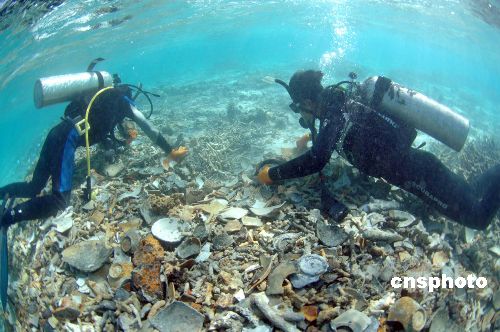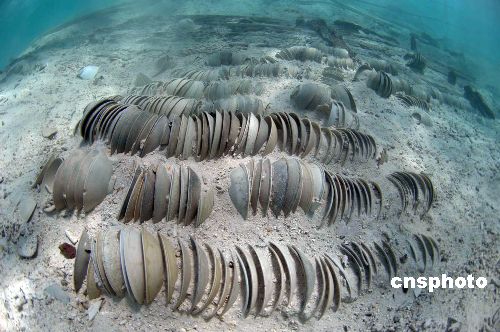Undersea excavation reveals bounteous booty
时间:2007-05-09 05:53:25
(单词翻译:单击)

| This undated photo shows Chinese archaeologists working in undersea conditions, excavating1 a shipwreck2 in the South China Sea. Part of the cultural relics3 excavated5 from the "Huaguangjiao No.1" were shown to the media in Haikou, capital of south China's Hainan province on Tuesday, May 8, 2007. |

| May 9 - A Chinese archeology team has finished excavation6 work on an ancient shipwreck off the Xisha islands in the South China Sea, and revealed bounteous7 results.
This is the first time that China has conducted undersea excavation work in the open seas. Zhang Wei, director of the marine8 archeology research center of the Chinese National Museum, said the excavation started on March 15th and lasted for 55 days, excavating over 10,000 cultural relics. The excavation of "Huaguangjiao No.1" was well-prepared and conducted with precision, marking a significant milestone9 in China's undersea archaeology10 history. Relics found at the site include green glazed11 porcelain12 plates, shadowy blue porcelains13 and other rare antiques. It is believed to have been a merchant ship built in the Southern Song Dynasty (1127-1279). The sunken ship, measuring 20m in length, 6m in width, and with an estimated displacement14 of 60 tons, was discovered in the 1990s - as the first vessel15 China discovered in the open seas. Named "Huaguangjiao No. 1", meaning Huangguang Reef No.1, the shipwreck has important significance in the process of researching ancient China's Maritime16 Silk Road. "Huaguangjiao No.1 and Nanhai No.1, which is currently being excavated off the coast of south China's Guangdong province, are two pearls along the ancient Maritime Silk Road. The two have equal significance," Zhang Wei said, "but Huaguangjiao No.1 is located in the open seas, and is more difficult to excavate4." Located 330 kilometers southeast of south China ’s Hainan Province, the Xisha Islands are one of four large island groups in the South China Sea. |
点击 收听单词发音
收听单词发音
 收听单词发音
收听单词发音
1
excavating

|
|
| v.挖掘( excavate的现在分词 );开凿;挖出;发掘 | |
参考例句: |
|
|
|
2
shipwreck

|
|
| n.船舶失事,海难 | |
参考例句: |
|
|
|
3
relics

|
|
| [pl.]n.遗物,遗迹,遗产;遗体,尸骸 | |
参考例句: |
|
|
|
4
excavate

|
|
| vt.挖掘,挖出 | |
参考例句: |
|
|
|
5
excavated

|
|
| v.挖掘( excavate的过去式和过去分词 );开凿;挖出;发掘 | |
参考例句: |
|
|
|
6
excavation

|
|
| n.挖掘,发掘;被挖掘之地 | |
参考例句: |
|
|
|
7
bounteous

|
|
| adj.丰富的 | |
参考例句: |
|
|
|
8
marine

|
|
| adj.海的;海生的;航海的;海事的;n.水兵 | |
参考例句: |
|
|
|
9
milestone

|
|
| n.里程碑;划时代的事件 | |
参考例句: |
|
|
|
10
archaeology

|
|
| n.考古学 | |
参考例句: |
|
|
|
11
glazed

|
|
| adj.光滑的,像玻璃的;上过釉的;呆滞无神的v.装玻璃( glaze的过去式);上釉于,上光;(目光)变得呆滞无神 | |
参考例句: |
|
|
|
12
porcelain

|
|
| n.瓷;adj.瓷的,瓷制的 | |
参考例句: |
|
|
|
13
porcelains

|
|
| n.瓷,瓷器( porcelain的名词复数 ) | |
参考例句: |
|
|
|
14
displacement

|
|
| n.移置,取代,位移,排水量 | |
参考例句: |
|
|
|
15
vessel

|
|
| n.船舶;容器,器皿;管,导管,血管 | |
参考例句: |
|
|
|
16
maritime

|
|
| adj.海的,海事的,航海的,近海的,沿海的 | |
参考例句: |
|
|
|
©2005-2010英文阅读网




